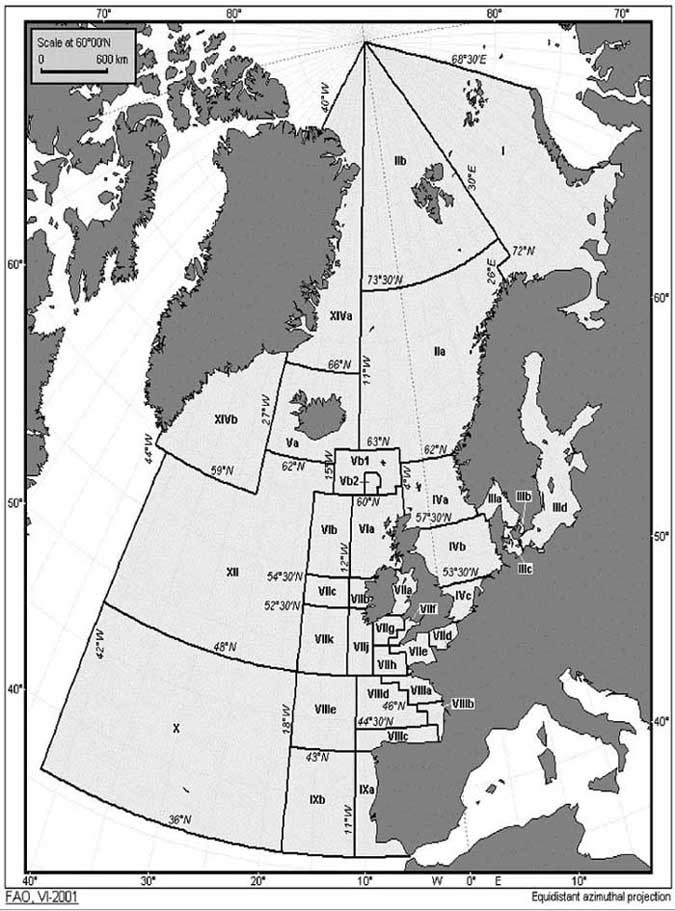Established by the Convention for the International Council for the Exploration of the Sea, signed in Copenhagen, Denmark, on 12 September 1964. The Council had been established in 1902 and the new Convention aimed to facilitate the implementation of its Programme. The Convention entered into force on 22 July 1968.
Area of Competence
The area of competence of the Council as described in Article 2 of the Convention is the Atlantic Ocean and its adjacent seas with emphasis on the North Atlantic. There is no precise delimitation of this area by lines of longitude and latitude. In practice ICES is primarily, but not exclusively, concerned with FAO Statistical Area 27 (Map 14).
Species Covered
The Council covers all living marine resources in its area of competence.
Membership
Membership of the Council is subject to the approval of three quarters of the Member States. The present members of the Council are: Belgium, Canada, Denmark, Estonia, Finland, France, Germany, Iceland, Ireland, Latvia, Netherlands, Norway, Poland, Portugal, Russia, Spain, Sweden, UK, and USA.
Six countries are Affiliates of ICES, through named institutes: Australia (CSIRO Marine Research, Hobart), Chile (Instituto de Fomento Pesquero, Valparaiso), Greece (Institute of Marine Biology of Crete, Heraklion), New Zealand (National Institute of Water and Atmospheric Research, Wellington), Peru (Instituto del Mar del Peru, Callao) and South Africa (Institute of Marine and Coastal Management, Cape Town).
Objectives and Activities
The main objectives of the Council are (a) to promote and encourage research and investigations for the study of the sea particularly those related to the living resources thereof; (b) to draw up programmes required for this purpose and to organize such research and investigation as may appear necessary; and (c) to publish or otherwise disseminate the results of its research and investigations. ICES itself is not a management body. ICES is a scientific body, which also provides advice to regulatory Commissions in the North Atlantic area and to its Member Countries. For fisheries management and related ecosystem issues, these client Commissions are EC, IBSFC, NASCO and NEAFC.
ICES has an Advisory Committee on Fishery Management (ACFM), which has primary responsibility for scientific information and advice on the status, outlook and exploitation of living marine resources. While not the exclusive source of ICES advice on fisheries management, ACFM is the primary source of the scientific advice for ongoing fishery management needs, such as setting Total Allowable Catches (TACs). Such information and advice concern fishery resources both within areas under national jurisdiction and on the high seas.
ICES also has an Advisory Committee on Ecosystems (ACE), which has the primary responsibility for scientific information and advice on the status and outlook for marine ecosystems, and on exploitation of living marine resources in an ecosystem context. ACE provides a focus for advice that integrates consideration of the marine environment and fisheries in an ecosystem context, such as the ecosystem effects of fishing.
Implementation of Post-UNCED Fishery Instruments
Implementation of the post-UNCED fishery instruments is outside the area of competence of ICES.
Map 14 - FAO Statistical Area 27 - Coincides with Areas for NAMMCO and ICES

Addressing Specific Issues
ICES scientific advice has incorporated the precautionary approach since 1998.
ICES provides scientific advice related to ecosystem-based fisheries management, e.g. bycatches of marine mammals, seabirds/fisheries interactions, and ecosystem effects of fishing (e.g. on cold-water corals).
Activities and plans are ongoing to strengthen the organization’s capacity to deal more effectively with important conservation and management issues.
The issues of IUU fishing, capacity, new entrants, and catch certification and documentation are outside the area of competence of ICES.
Established by the Convention for a North Pacific Marine Science by Canada, China, Japan, the United States and the Soviet Union Organization, signed in Ottawa, Canada on 12 December 1990 and entered into force on 24 March 1992.
Area of Competence
The area covered by the Convention is the temperate and Sub-Arctic region of the North Pacific Ocean and adjacent seas, especially northward from 30°N latitude. The activities of the Organization may, for scientific reasons, extend farther southward in the North Pacific Ocean. This area coincides with FAO Statistical Area 67 as well as part of FAO Statistical Areas 61 and 77 (SEE Map 2).
Species Covered
The species covered by the Organization are all living marine resources within its area of competence.
Membership
The membership of the Organization is open to the five signatory States. After entry into force, the Convention is open for accession by non-signatory States subject to a unanimous approval by the Contracting Parties. The present members of PICES are: Canada, Japan, China (People’s Republic of), Korea (Republic of), Russian Federation and the United States.
Objectives and Activities
The objectives of the Organization are (a) to promote and coordinate marine scientific research in order to advance scientific knowledge of the area concerned and of its living resources, including but not necessarily limited to research with respect to the ocean environment and its interactions with land and atmosphere, its role in and response to global weather and climate change, its flora, fauna and ecosystems, its uses and resources, and impacts upon it from human activities; and (b) to promote the collection and exchange of information and data related to marine scientific research in the area concerned.
The Organization consists of (a) a Governing Council, (b) Finance and Administration Committee, (c) Science Board, and (d) a Secretariat. The activities of the Organization is purely scientific and will cover both areas under national jurisdiction and the high seas under its competence. The Organization is not empowered to recommend regulatory measures.
|
[112] The information is
unchanged from FIPL Circular 908. |